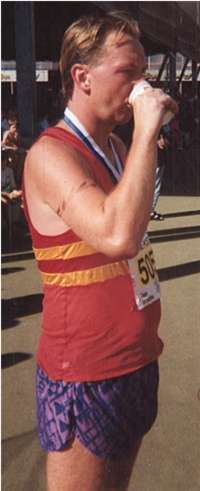There is a huge amount written about nutrition for athletes. Much of the advice is dauntingly long and complicated, and some of it is contradictory. As a new runner, you won't go far wrong if you stick to these general.
- If you exercise regularly, you need to eat and drink more. If you start exercising but go on eating the same amount, you will lose
weight. (This may be what you want, in which case see the article on losing weight.) Running, jogging or walking a mile burns about 100 calories; and if you run regularly, your resting metabolism will increase. If you run 40 miles a week, you'll need to eat about 600-700 calories a day extra.

David Street rehydrating
after a marathon - Eat plenty of a wide variety of fresh or unprocessed foods. Your body needs carbohydrate, protein and fat, as well as vitamins, mineral, trace elements and water. If you deny it those things, you are likely to become lethargic, ill or get injured.
- Drink lots of water. Try to consume at least 2 litres a day. Always have a bottle of water on your desk at work, and sip regularly during the day. Put a bottle on the kitchen table and sip whenever you walk past. Being properly hydrated will improve your running and your complexion! Tea and coffee don't help: they are diuretic (ie they make you urinate more) so they increase the need to drink water. (Herbal tea is OK.)
- Eat more carbohydrates. About half of your daily calories should come from carbohydrates. This means lots of potatoes, pasta, bread, cereals and fruit. Where possible, try to eat unprocessed foods. Unfortunately, most pasta (the runner's staple) is refined: try wholemeal instead.
- Eat a low fat diet. You should not eliminate fats altogether, but they should not form more than about 15 per cent of your calorie intake each day. This is not much fat.
- Replenish your carbohydrates within two hours of exercise. Your muscles will recover much more quickly, and your body will increase its capacity to store glycogen, if you eat easily digestible carbohydrates (eg bananas) or drink a recovery sports drink soon after exercise – preferably within half an hour, and certainly within two hours.
- Keep a food diary. You might be surprised by what you are really eating, even if you think you have a healthy diet. For a week, keep track of everything you eat, and break it down into carbohydrate, fat and protein.
- You probably don't need vitamin supplements. If you eat a varied diet and you ensure that your fruit and vegetables are fresh, you should get the vitamins and minerals you need. But some runners on a heavy training schedule take a multi-vitamin tablet each day, and if you are prone to infections you might want to take Vitamin C and Zinc supplements.
- Eat little and often. Ideally, start the day with a big breakfast with plenty of carbohydrates, such as muesli or toast. This will give you more fuel for the day, and help to increase your carbohydrate intake. Then eat every 4 hours or so. It is better to keep your body topped up than to let your blood sugar levels swing.
No comments:
Post a Comment